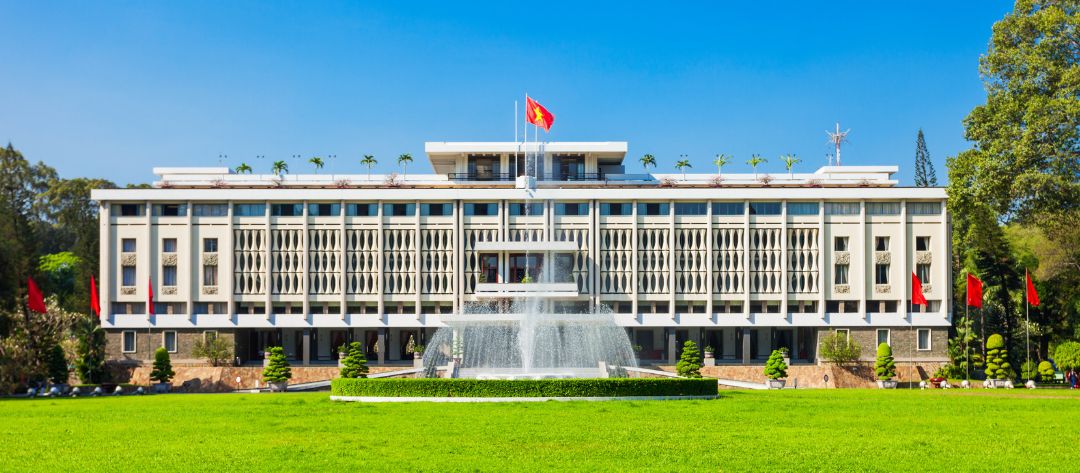The Vietnam War left an indelible mark on those who served, with many veterans carrying the weight of their experiences for decades. Vietnam tours for veterans offer a unique opportunity for these individuals to reconnect with their past, honor fallen comrades, and gain a deeper understanding of the conflict from the Vietnamese perspective. These tours are more than just a journey through history; they are paths to healing, reconciliation, and finding closure.
Reasons Why Veterans Choose to Tour Vietnam
For many veterans, Vietnam is not just a country; it’s a chapter of their lives filled with intense memories, both good and bad. Returning to Vietnam can be a way to confront those memories, find closure, and even create new, positive experiences in a place that once held so much pain.
Reconnecting with The Emotional Landscape
For many veterans, the scars of the Vietnam War are still fresh, and returning to Vietnam is a way to reconnect with the past.
Imagine stepping off the plane and feeling the warm, humid air of Vietnam. It’s like a wave of nostalgia hitting you, but this time, you’re not here for combat. You’re here to heal. The landscapes that once were battlegrounds are now serene and peaceful, a stark contrast to the chaos of the past. It’s a powerful experience, seeing the country in a new light.
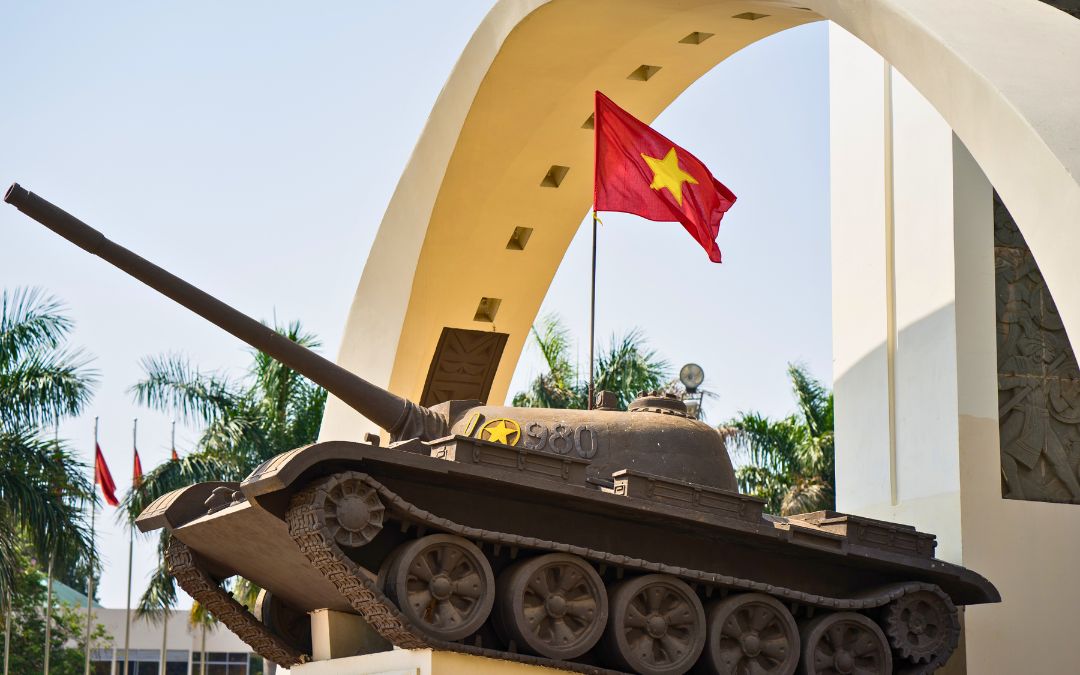
Vietnam Victory monument in Buon Ma Thuot city
Understanding the Vietnamese Perspective
One of the most impactful parts of these tours is meeting the Vietnamese people. Many veterans find it incredibly healing to connect with locals, hear their stories, and share their own. It’s a chance to see the humanity on both sides of the conflict and realize that, despite the past, there’s a shared desire for peace and understanding.
The Healing Power of Nature
Vietnam’s natural beauty is another aspect that can be incredibly healing. From the lush green rice paddies to the stunning beaches of Da Nang, the country’s landscapes offer a sense of peace and tranquility. Many tours include time for relaxation and reflection in these beautiful settings, allowing veterans to process their emotions in a calming environment.
Understanding and Education
Vietnam tours for veterans also provide an educational experience. They offer an opportunity to learn about the history and culture of Vietnam, providing a broader perspective on the war and its impact. Veterans can visit museums, historical sites, and interact with local people, gaining a deeper understanding of the country they once fought in.
>> Read More: Explore These 14 Vietnam Historical Landmarks To Learn About The Country’s Intriguing Past
Destinations Should Be Included in Vietnam Tours for Veterans
Dien Bien Phu
Dien Bien Phu holds a crucial place in Vietnam’s military history as the site of a decisive battle that ended French colonial rule.
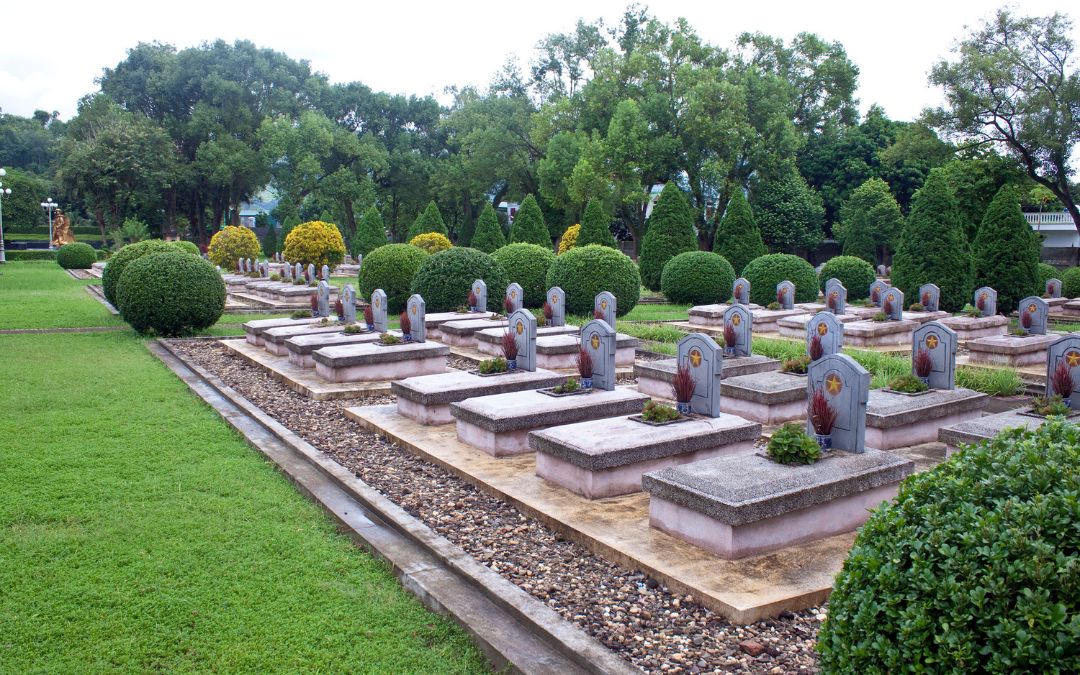
Military cemetery in Dien Bien Phu
As the site of the decisive battle that marked the end of the First Indochina War between the French and the Viet Minh forces, Dien Bien Phu represents a pivotal moment in Vietnam’s struggle for independence. For veterans, this is a chance to walk the very grounds where a remarkable Vietnamese victory over a colonial power took place, shedding light on the complexities and sacrifices of the war.
What you can experience in this place
- Visit the Dien Bien Phu Victory Museum: This museum offers a comprehensive overview of the battle, with exhibits, artifacts, and historical information that provide valuable insights for veteran travelers.
- Tour the Dien Bien Phu Battlefields: Exploring the actual battlegrounds, including the historic hills and fortifications, can give veteran travelers a deeper understanding of the tactics and challenges faced by both sides during the conflict.
- See the Bunkers and Trenches: Visiting the network of underground bunkers, tunnels, and trenches that were used during the battle can provide a visceral connection to the experiences of the soldiers who fought there.
Hanoi
Hanoi played a crucial role during the Vietnam War, as it was the capital of North Vietnam. Many important historical sites and museums related to the war are located in Hanoi, providing valuable insights for veteran travelers.
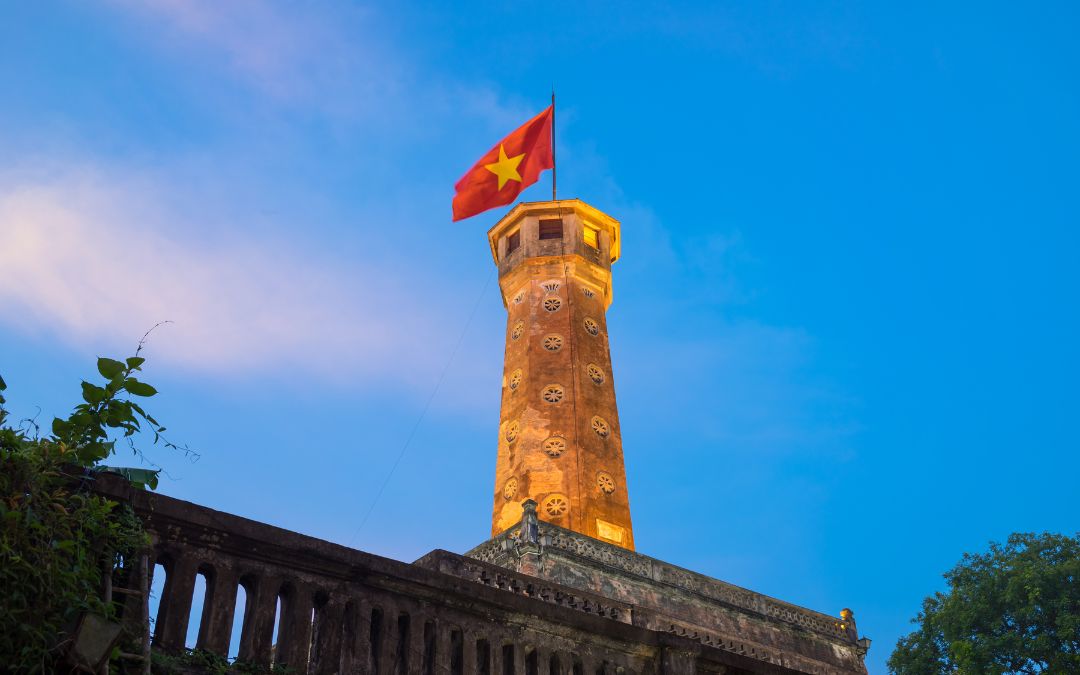
Hanoi’s Flag Tower
It is also the home to several prominent war memorials and monuments, such as the Vietnam Military History Museum and the Hoa Lo Prison (known as the “Hanoi Hilton”), which hold deep significance for those who served in the war.
Top places veterans should explore in Hanoi
- Vietnam Military History Museum: This museum offers an extensive collection of war artifacts, documents, and displays that provide a comprehensive overview of Vietnam’s military history, including the Vietnam War.
- Hoa Lo Prison: Also known as the “Hanoi Hilton,” this former prison was used by the North Vietnamese to hold American prisoners of war, including Senator John McCain. Touring the prison offers a sobering glimpse into the experiences of POWs during the war.
- Ho Chi Minh Mausoleum and Presidential Palace: These sites were the heart of the North Vietnamese government during the war and hold great historical significance for veteran travelers.
>> Read More: 10 Best Romantic Things To Do In Hanoi For Couples
Hue
Hue served as the imperial capital of Vietnam during the Nguyen dynasty and played a crucial role in the Vietnam War, particularly during the Tet Offensive in 1968.
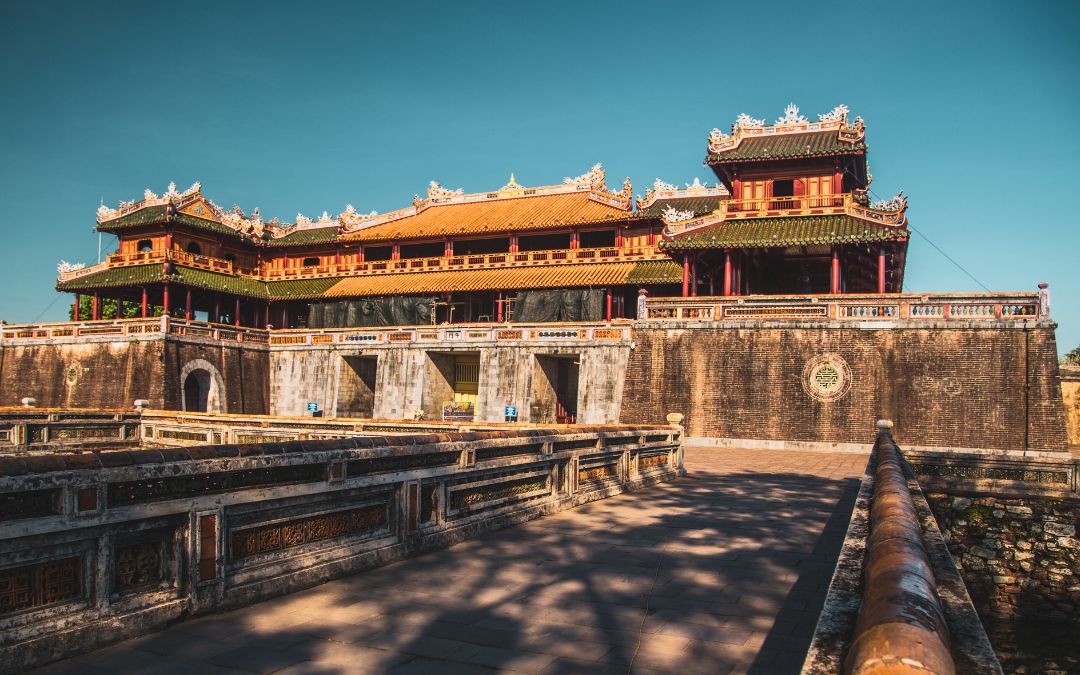
Hue Imperial City Entrance
The ancient citadel and surrounding areas were scenes of fierce battles, offering veterans a chance to honor the sacrifices made there. The city’s historic temples and pagodas provide a serene backdrop for contemplation, allowing visitors to reflect on the war’s impact and the enduring spirit of those who fought.
Top things veteran travelers can do in Hue
- Attend a Reenactment or Commemorative Event: Hue often hosts reenactments and commemorative events related to the Vietnam War, which can be deeply meaningful experiences for veteran travelers.
- Explore the Demilitarized Zone (DMZ): The DMZ, the former border between North and South Vietnam, is located just north of Hue and offers veteran travelers the opportunity to visit historic sites and gain a better understanding of the division of the country during the war.
- Visit the Hue Citadel and Forbidden Purple City: These UNESCO World Heritage sites were the seat of the Nguyen Dynasty and the site of fierce battles during the Tet Offensive. Exploring these historic structures can provide valuable insights into the conflict.
Quang Ngai
Quang Ngai province was the location of several major battles and operations during the Vietnam War, including the infamous My Lai Massacre site, a place of deep sorrow and reflection.
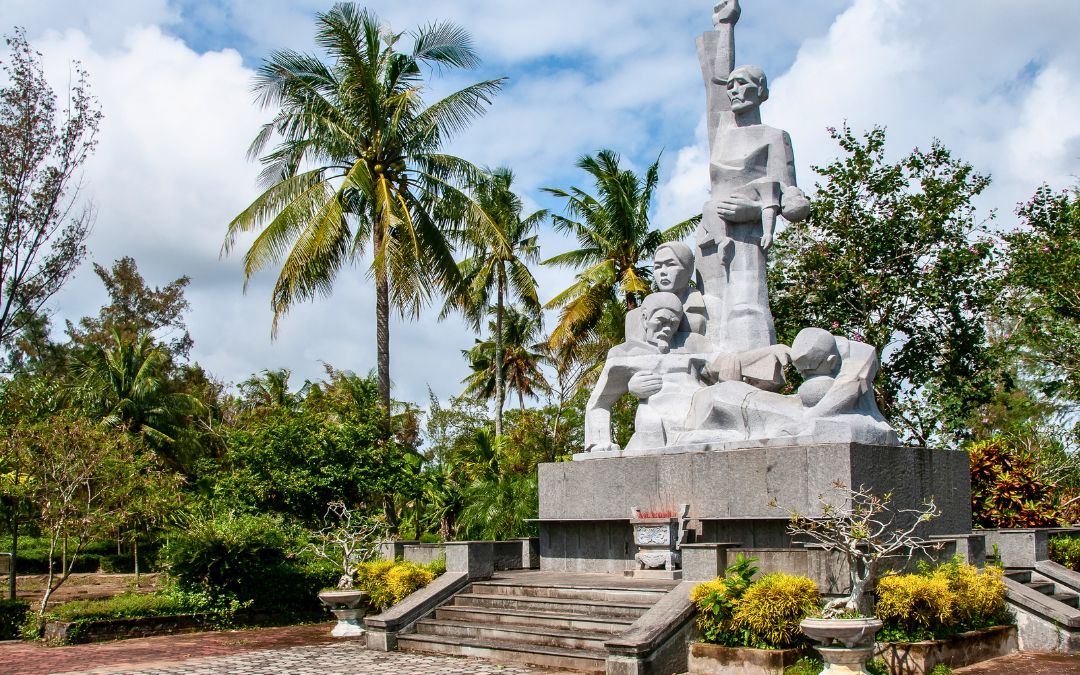
Son My Memorial recalls the My Lai massacre
Visiting this site allows veterans to pay their respects to the innocent lives lost and grapple with the profound human cost of the war. The memorial here serves as a stark reminder of the need for peace, empathy, and reconciliation.
What veteran travelers can experience in Quang Ngai
- Visit the My Lai Memorial and Museum: This sobering site commemorates the victims of the 1968 My Lai Massacre, one of the most infamous incidents of the Vietnam War. Visiting the memorial and museum can be a deeply meaningful and reflective experience for veteran travelers.
- Explore the Son My Memorial: This memorial site honors the victims of the My Lai Massacre and other atrocities committed during the war. Veteran travelers can pay their respects and reflect on the human cost of the conflict.
- Participate in a Dialogue with Local Veterans: Connecting with Vietnamese veterans who experienced the war firsthand can offer valuable perspectives and personal stories that can enrich the experience for visiting veterans.
Quang Nam
Quang Nam, with its historical sites and beautiful landscapes, offers veterans a blend of reflection and natural beauty. Chu Lai, once a major U.S. Marine base, offers a significant historical site where veterans can contemplate the strategic importance and personal memories tied to this location.
While not directly related to the war, the ancient town of Hoi An offers a peaceful setting where veterans can unwind and reflect on their experiences, symbolizing Vietnam’s resilience and renewal.
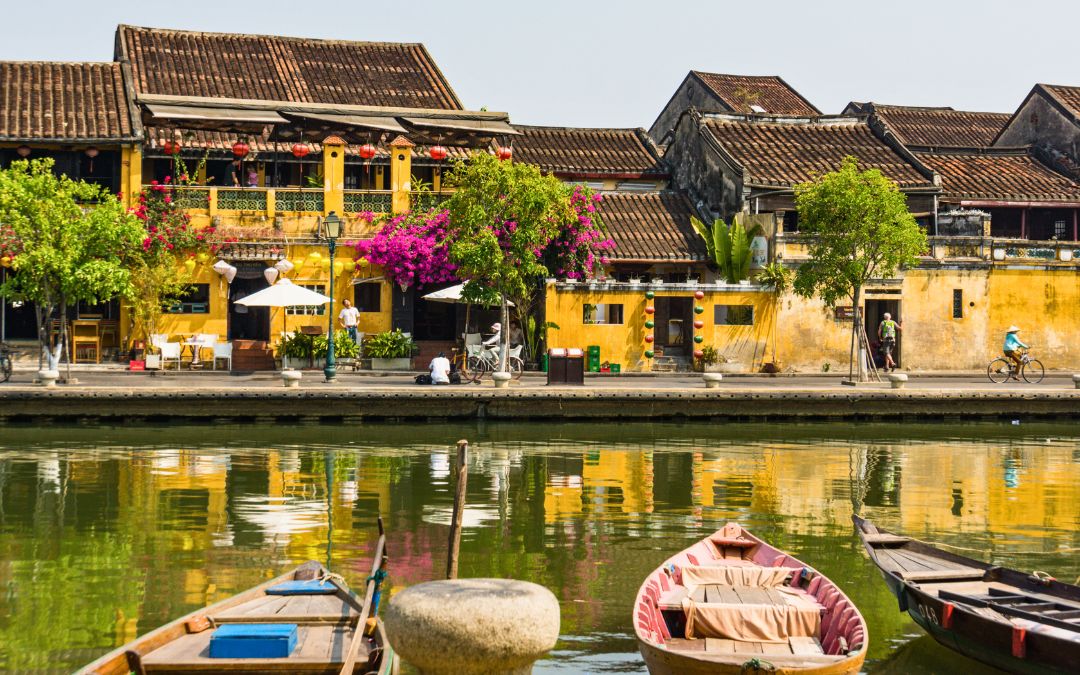
Hoi An can be a perfect escape for veterans
Top things veteran travelers can enjoy here
- Visit the Tam Ky Battlefield: This site was the location of a major battle in 1969, and veteran travelers can learn about the strategies and tactics employed during the conflict.
- Explore the Ky Anh Base: This former U.S. military base was an important hub for operations in the region, and visiting it can provide veteran travelers with a better understanding of the day-to-day lives of soldiers during the war.
- Tour the Hoi An Ancient Town: This well-preserved historic town, with its charming architecture and vibrant culture, can offer veteran travelers a respite from the more somber war-related sites and a chance to experience the beauty of Vietnam.
Da Nang
Da Nang was a crucial strategic location during the Vietnam War, serving as a major port and air base for U.S. and South Vietnamese forces.
The nearby Marble Mountains, used as a strategic base during the war, offer a unique combination of natural beauty and historical significance. The caves and tunnels within these mountains provide a poignant connection to the past, allowing veterans to reflect on their experiences and the resilience of those who lived through the war.
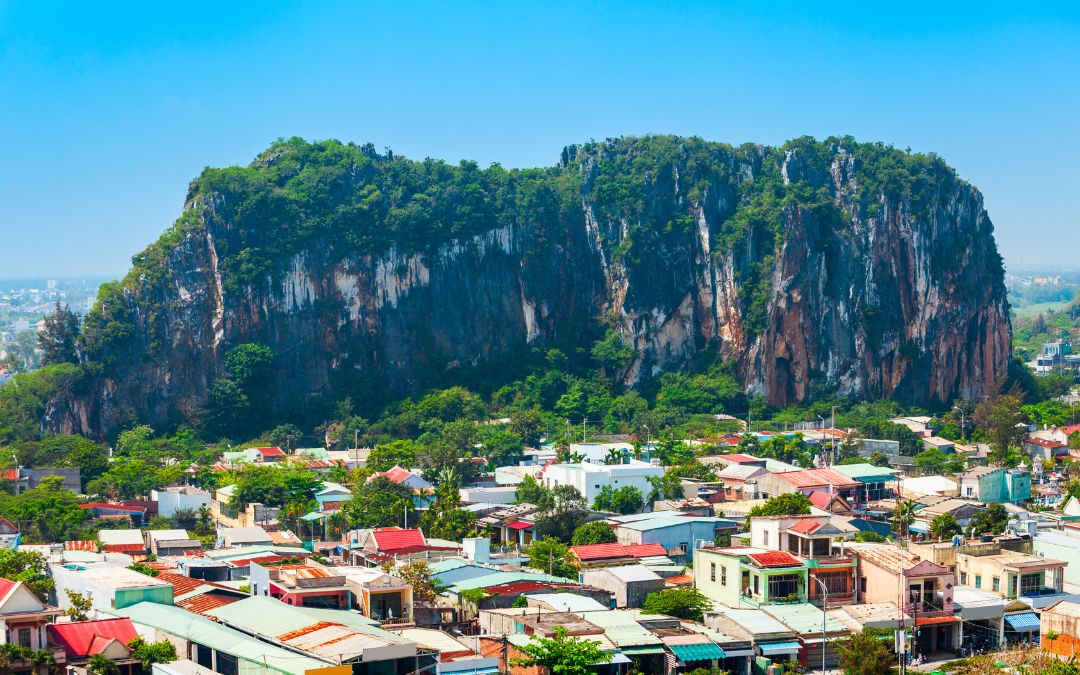
Marble Mountain in Da Nang, a strategic hub for the military effort in the past
What veteran travelers can enjoy in Da Nang
- Explore the Marble Mountains: These limestone hills, which were used as shelters and hideouts during the war, offer veteran travelers a chance to connect with the natural landscape and gain a better understanding of the challenges faced by soldiers.
- Tour the Da Nang Air Base: This former U.S. Air Force base was a crucial hub of activity during the war, and visiting it can give veteran travelers a sense of the scale and complexity of the military operations that took place in the region.
- Visit the Hai Van Pass: This scenic mountain pass, which was the site of fierce battles during the war, can offer veteran travelers a chance to reflect on the challenges and hardships faced by soldiers in the region.
>> Read More: 15 Da Nang Tourist Attractions That Will Make You Fall In Love With This City
Ho Chi Minh City
Ho Chi Minh City, formerly Saigon, is essential for veterans seeking to understand the full scope of the Vietnam War.
The War Remnants Museum provides a sobering look at the war’s impact on Vietnam and its people, fostering empathy and reflection. The Reunification Palace, where the war officially ended in 1975, holds profound historical importance. Walking through these landmarks allows veterans to gain a deeper understanding of the war’s legacy and the enduring strength of the Vietnamese people.
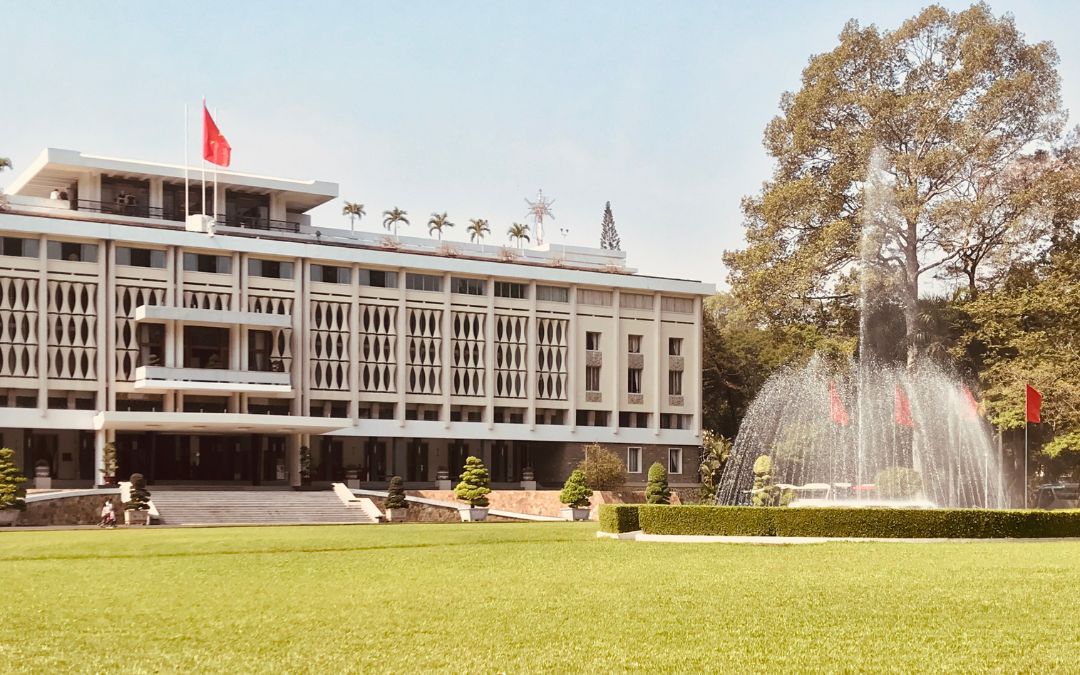
The Reunification Palace in Ho Chi Minh City
Things to do in Ho Chi Minh City during your veteran tour
- Visit the War Remnants Museum: This museum provides a comprehensive and compelling look at the Vietnam War from the Vietnamese perspective, offering veteran travelers a new lens through which to understand the conflict.
- Explore the Reunification Palace: This historic building was the site of the final battle of the Vietnam War, and visiting it can be a powerful and emotional experience for veteran travelers.
- Visit the Saigon Opera House: This historic building, which served as a gathering place for the French colonial elite during the war, can provide veteran travelers with a glimpse into the cultural and social dynamics of the era.
>> See Tour: From Central To Southern Vietnam
Cu Chi Tunnels
Being famous for the extensive underground network used by the Viet Cong during the war, Cu Chi tunnels represent the resilience and determination of the Vietnamese people in the face of overwhelming military might.
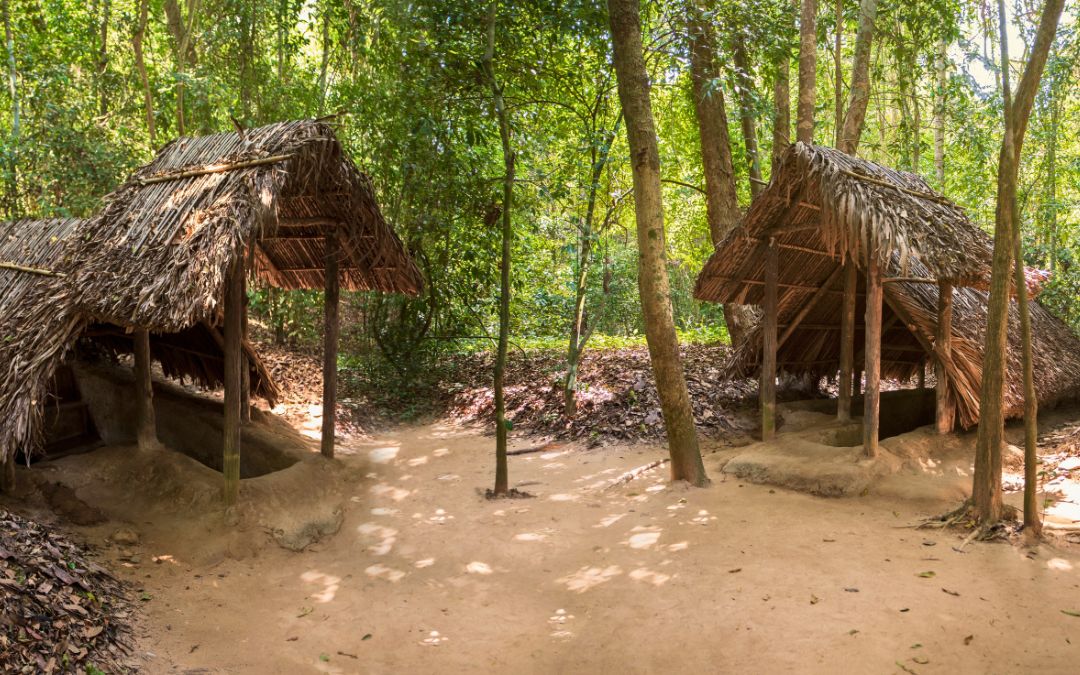
The guerrilla camp at Cu Chi tunnels
Visiting these tunnels offers veterans a firsthand look at the living conditions and strategies employed by Vietnamese fighters, highlighting their ingenuity and resilience. This experience provides a powerful and emotional connection to the war’s history, fostering a sense of respect and understanding.
Top experiences for veteran travelers at the Cu Chi Tunnels
- Guided Tour of the Tunnel System: Veteran travelers can explore the intricate network of tunnels, which includes living quarters, hospitals, and command centers, gaining a firsthand understanding of the challenges faced by the Viet Cong.
- Weapon Demonstrations: The site offers demonstrations of the various weapons and traps used by the Viet Cong, which can provide veteran travelers with a better appreciation for the ingenuity and resourcefulness of their adversaries.
- Reenactment of Tunnel Warfare: Some tour operators offer the opportunity for veteran travelers to engage in simulated tunnel warfare activities, allowing them to experience the claustrophobic and intense conditions faced by soldiers during the conflict.
>> You might be interested in: A Day of Discovery with Cu Chi Tunnels & Mekong Delta Tour
Phu Quoc
Mostly well-known for its stunning beaches, Phu Quoc also has a darker past as the site of a former prison used during the war.
Veterans can visit the Phu Quoc Prison to understand more about the harsh conditions faced by prisoners. The island’s natural beauty offers a peaceful setting for reflection and healing, symbolizing the country’s journey from conflict to renewal.
Phu Quoc’s transformation from a war-torn island to a thriving tourist destination can serve as a symbol of Vietnam’s resilience and recovery in the aftermath of the conflict.
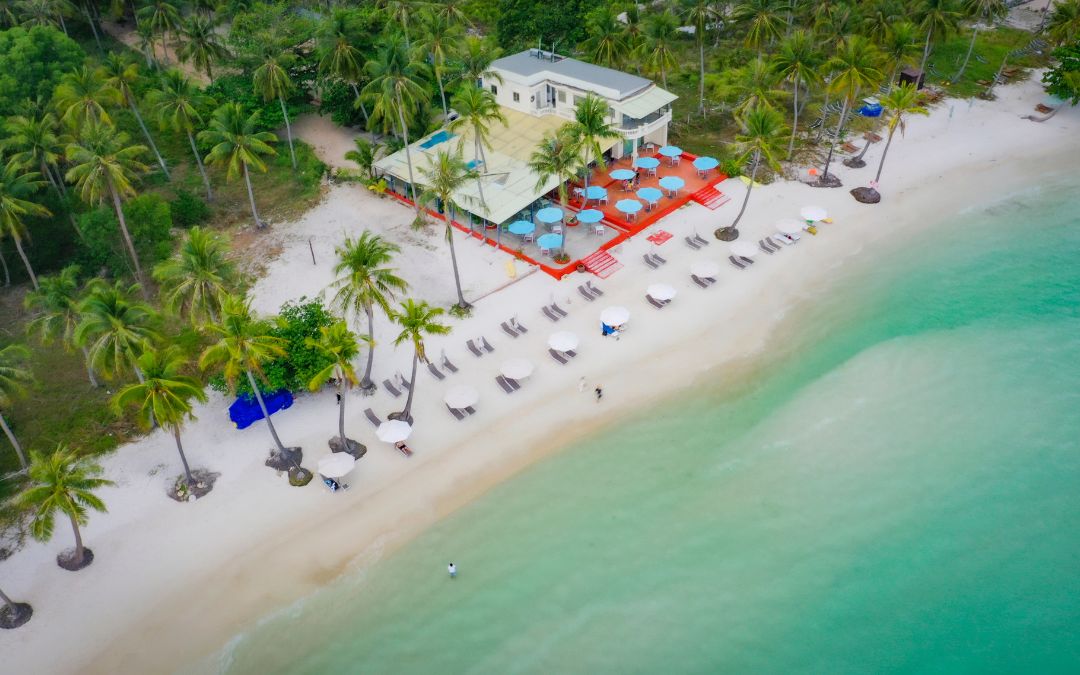
Phu Quoc is the top travel destination in Vietnam
Top experiences for veteran travelers in Phu Quoc
- Visit Phu Quoc Prison Museum: This trip provides a sobering look at the harsh conditions and treatment of prisoners during the Vietnam War.
- Beach Relaxation: Veteran travelers can spend time soaking up the sun, swimming in crystal-clear waters, and enjoying the island’s stunning natural beauty, which can be a healing and restorative experience.
- Exploration of the Island’s History: Phu Quoc has a rich history, including its role as a prison camp during the Vietnam War. Veteran travelers can visit historical sites and museums to learn more about the island’s wartime past.
>> See Tour: Splendours of Vietnam & Pristine Beach
Con Dao
Con Dao, a group of islands off the southern coast of Vietnam, is known for its former prison complex, where political prisoners were held during both the French colonial period and the Vietnam War.
The Con Dao Prison, often referred to as the “Devil’s Island of Indochina,” witnessed significant suffering and resilience. Visiting this site provides veterans with a deep sense of empathy for those who endured brutal conditions. The island’s serene beaches and lush landscapes offer a stark contrast to its grim history, providing a space for reflection and peace.
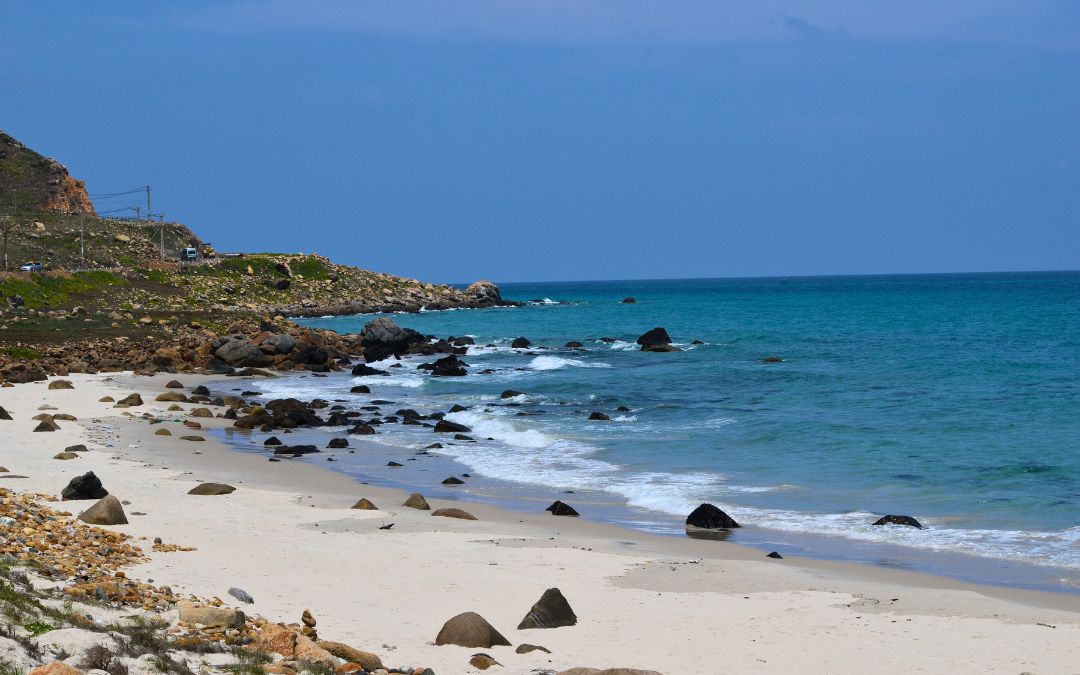
Beach in Con Dao
What veteran travelers can expect in Con Dao
- Guided Tour of the Prison Complex: Veteran visitors can explore the remnants of the prison system, including the cells, interrogation rooms, and execution sites, gaining a firsthand understanding of the harsh conditions and the experiences of the prisoners.
- Interaction with Local Guides: Engaging in dialogue with local guides who have personal connections to the history of Con Dao can provide veteran travelers with unique perspectives and insights into the significance of the site.
- Exploration of the Island’s Natural Beauty: Con Dao is surrounded by crystal-clear waters, lush tropical forests, and diverse marine ecosystems, which veteran travelers can discover through hiking, snorkeling, or other outdoor activities.
>> Read More: Con Dao – A Completed Guide To Vietnam’s Untamed Paradise
Exploring these destinations in Vietnam allows veterans to connect with the country’s history on a profound level. The combination of historical sites and natural beauty throughout Vietnam offers a journey of remembrance, empathy, and healing. Each location provides a unique perspective on the Vietnam War, fostering a deeper understanding and appreciation for the strength and resilience of the Vietnamese people.
Considerations for Choosing Vietnam Tours for Veterans
When planning a tour of Vietnam for veterans, several key considerations must be taken into account to ensure the trip is meaningful, respectful, and supportive of their needs.
Physical Fitness and Accessibility
First and foremost, assessing the physical demands of the tour is crucial. Veterans may have varying levels of physical fitness and mobility, so tours should be designed to accommodate different abilities. This includes offering both challenging and more accessible options.
Ensuring that sites, accommodations, and transportation are accessible for veterans with mobility issues is also imperative. This means providing information on the availability of ramps, elevators, and other facilities that make travel easier for those with disabilities.
Moreover, tours should be paced appropriately, allowing sufficient time for rest and reflection and avoiding overly packed schedules that might be physically taxing or overwhelming.
Mental and Emotional Wellbeing

Mental health and emotional health are both important with veteran tourists
Visiting war-related sites can be emotionally challenging for veterans. Therefore, it is important to have support systems in place, such as guides trained to handle sensitive topics and the availability of counseling services if needed.
Being mindful of potential triggers that could evoke traumatic memories is crucial. Providing veterans with detailed itineraries in advance allows them to prepare emotionally for the experiences they will encounter. Including opportunities for quiet, reflective time can help veterans process their experiences and emotions in a supportive environment.
Besides, traveling with fellow veterans can provide a sense of camaraderie and mutual understanding, so organizing group tours specifically for veterans can foster this supportive community.
Ethical Considerations
Respect for local communities and their histories is another critical aspect.
Tours should educate veterans about cultural sensitivities and the importance of honoring local customs and traditions. Providing balanced and accurate historical information is essential, as well as presenting multiple perspectives on the Vietnam War to help veterans gain a comprehensive understanding of the events and their impacts. Avoiding tours that exploit historical sites or local communities for commercial gain is also important.
Choosing operators committed to ethical tourism practices, including fair compensation for local guides and contributions to the preservation of historical sites, ensures a respectful approach. Promoting sustainable tourism practices that minimize environmental impact is also vital. Encouraging veterans to be mindful of their ecological footprint and support eco-friendly initiatives can make a significant difference.
Guided Tours with a Purpose
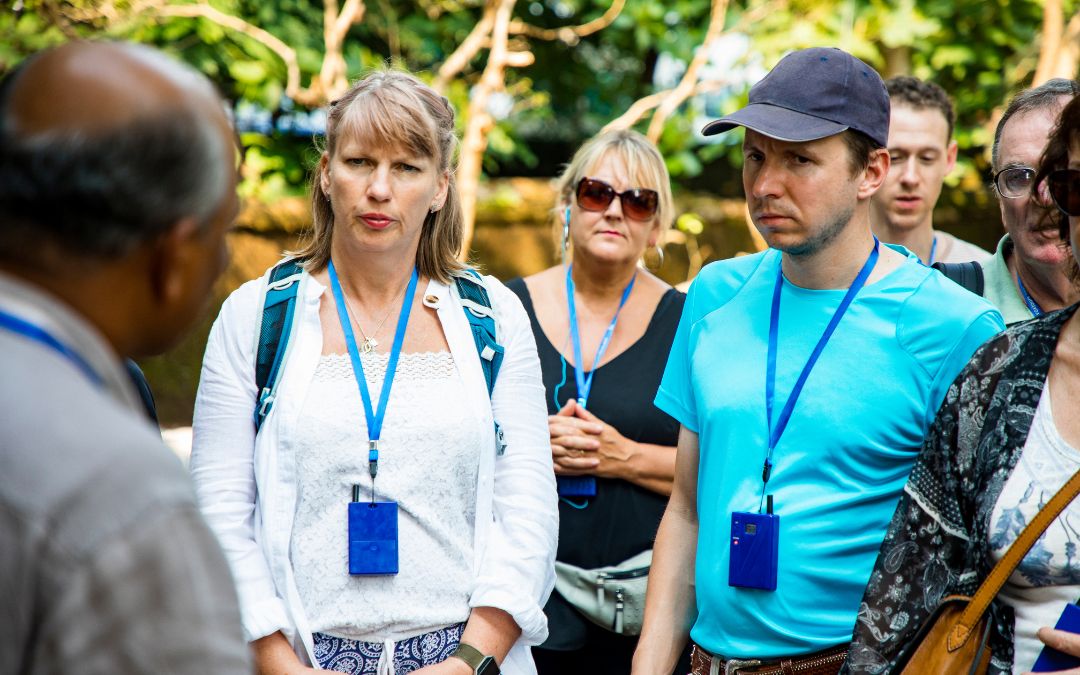
Veteran visitors can achieve much more from guided tours
One of the best ways to experience Vietnam as a veteran is through guided tours specifically tailored for you. These tours are not just about sightseeing; they’re about understanding, reflection, and connection.
You’ll visit significant historical sites like the Cu Chi Tunnels and the War Remnants Museum, but it’s not just about the past. These journeys also focus on Vietnam’s present and future, showing you how the country has grown and changed.
Moreover, for a visit to Vietnam that focuses on the experiences of veterans, choosing a reputable and specialized travel agency like Asia Pioneer Travel can make all the difference.
As one of the top tailor-made travel providers in the region, we understand and honor the unique experiences and needs of veterans. That’s why we offer personalized tours tailored to their individual history, goals, and preferences. Our specially trained guides provide dedicated support and exclusive access to sites while we take care of all logistics and provide round-the-clock assistance.
If you want to have a deeply meaningful immersion in Vietnam, reach out to our travel designers to start planning your transformative journey.
Final Notes
Vietnam tours for veterans are more than just a trip—they’re a journey of healing, reflection, and connection. For many veterans, returning to Vietnam is a way to confront the past, find closure, and create new, positive memories. Whether you’re a veteran yourself or someone who loves one, let’s pack our bags and take the first step toward healing and discovery together.

